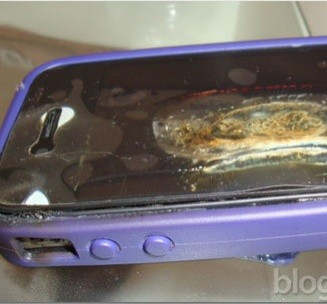Another iPhone 4 Spontaneously Combusts in Brazil

For the second time in a week, an Apple iPhone 4 has reportedly caught fire. A Brazilian iPhone owner had left the device plugged in overnight and woke up at dawn to discover his iPhone emitting smoke and sparks less than a foot from his face.
The phone and its protective cases were partially melted, but initial reports say the owner, identified as Ayla Mota, was not harmed, but extremely flustered. The 8 GB iPhone 4, which was recently introduced in Brazil, sells for more than $900, by far the world's heftiest price tag for that iPhone model.
I woke up seconds before witnessing the burning of my iPhone, Mota said. I saw a lot of sparks and black smoke coming out of the cell phone. My room was filled with an unbearable smell of smoke. That moment, I turned off the power switch in the room to remove the cell from the outlet. Soon after, I opened the windows and turned on the fan.
On Friday, Australian regional airline Regional Express reported that during a flight from Lismore to Sydney, a passenger's iPhone began glowing red and venting smoke. A flight attendant came over and doused the device with a fire extinguisher.
The Australian Transport Safety Bureau (ATSB) and the Civil Aviation Safety Authority (CASA) are both currently investigating the case.
We do have the phone, it's in our custody, and we will be undertaking a technical examination of it, said an ATSB spokesperson.
The ATSB says it has no previous records of iPhones undergoing spontaneous self-ignition, but several such cases have occurred with laptops, smartphones and iPhones.
In 2009, reports came pouring in from Europe detailing horrific explosions of Apple devices. In the Netherlands, an iPhone 3G turned bright red, caught fire and burned a hole through a car seat. In another instance, a French teenager claimed his iPhone cracked up and left a glass shard in his eye. The most similar case to the Regional Express plane incident occurred in Great Britain, where a teenage girl from Liverpool said her iPod Touch exploded after increasing in temperature and hissing violently. The father of the teenage owner said within 30 seconds there was a pop, a big puff of smoke, and [the phone] went 10 feet in the air. The father and daughter left the car as the phone combusted, and returned later to find the car filled with black smoke.
Apple did not admit liability in either case, telling the European Commission it regarded the explosions as isolated incidents with no evidence of a general problem. The company did, however, offer the teenaged Liverpool owner about a $271 refund, with a caveat that she agree that you will keep the terms and existence of this settlement agreement completely confidential. The Cupertino, Calif.-based company also added that a breach of confidentiality may result in Apple seeking injunctive relief, damages and legal costs against the defaulting persons or parties. The Liverpool owner did not sign the agreement, and thus was not compensated.
The iPhone 4 is made with a built-in rechargeable lithium-ion battery, which has been known to overheat. In 2006, Sony recalled its lithium-ion batteries in a move that cost the company $429 million. Two years later, Sony again recalled about 100,000 notebook batteries after learning about overheating issues.
The U.S. House of Representatives passed a rule in April that bars the Obama Administration from limiting shipments of lithium-ion batteries by air. The proposed rule, put together by the FAA and the Pipeline and Hazardous Materials Safety Administration, noted that 21 out of 44 lithium-ion battery incidents occurred on passenger aircraft; 16 involved carry-on luggage and one occurred in checked baggage. The other 23 incidents occurred on cargo aircraft, presumably where batteries were being shipped in bulk. The rule would have eliminated exceptions for small lithium-ion batteries, classifying all lithium-ion batteries kind as Class 9 hazardous cargo.
Apple's iPhone 4 is still the most popular and best-selling mobile handset in the U.S., followed by the iPhone 3GS, the HTC EVO 4G, the Motorola Droid 3, and Samsung Intensity II rounds out the top five. In October, Apple dropped the price of the iPhone 4 to $99.
© Copyright IBTimes 2024. All rights reserved.






















